Unit 1 Where didyou go on vacation?Section B 单词讲解课件+嵌入音频
文档属性
| 名称 | Unit 1 Where didyou go on vacation?Section B 单词讲解课件+嵌入音频 |  | |
| 格式 | pptx | ||
| 文件大小 | 18.5MB | ||
| 资源类型 | 试卷 | ||
| 版本资源 | 人教新目标(Go for it)版 | ||
| 科目 | 英语 | ||
| 更新时间 | 2022-07-20 11:21:05 | ||
图片预览

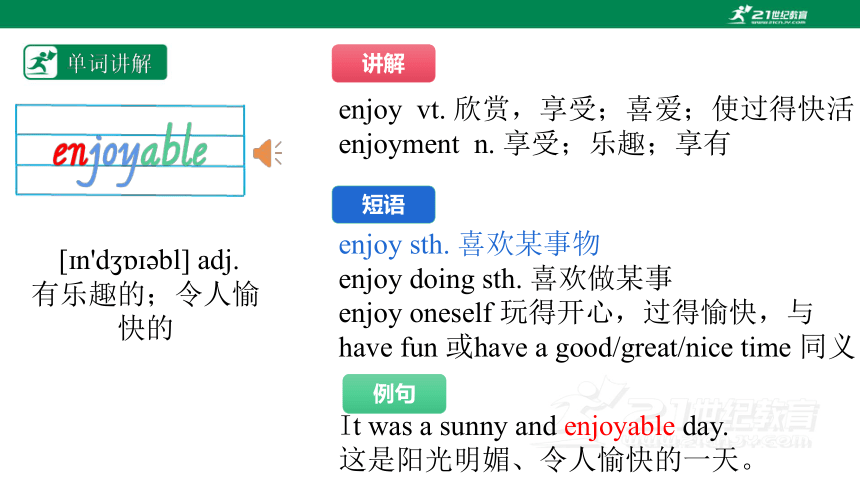
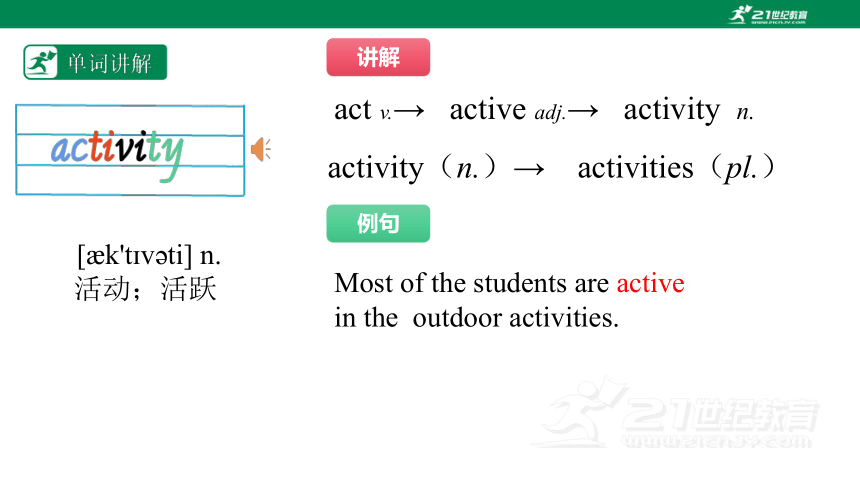
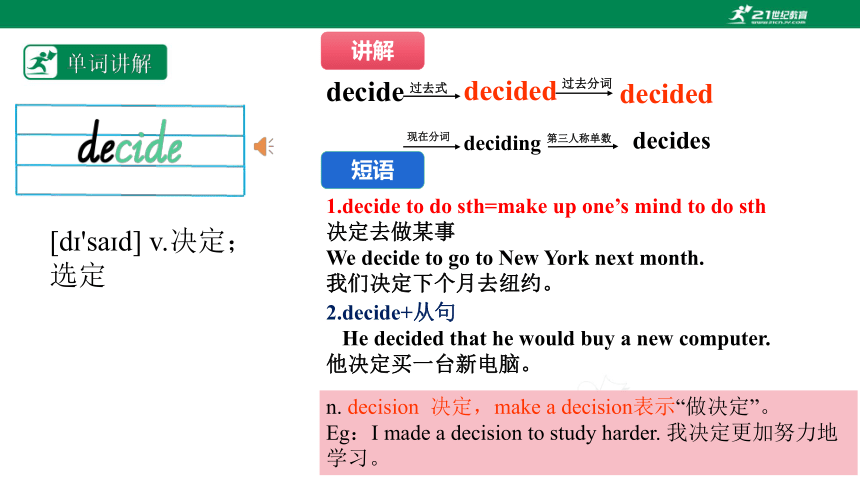
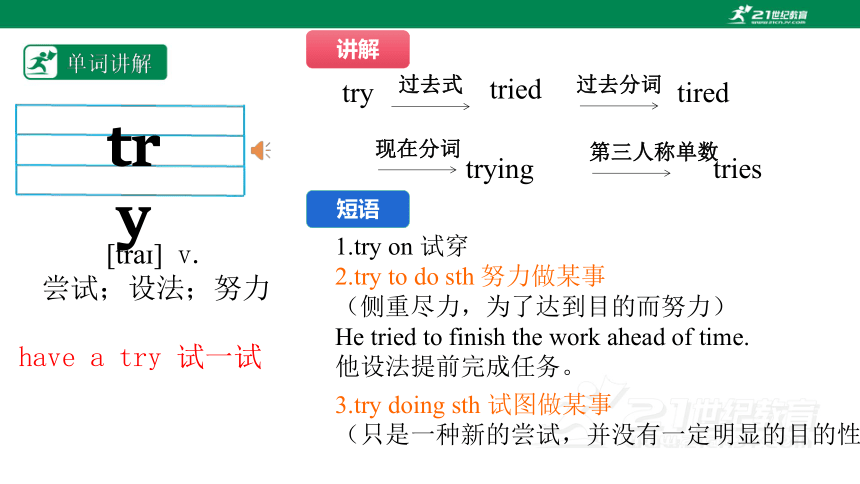
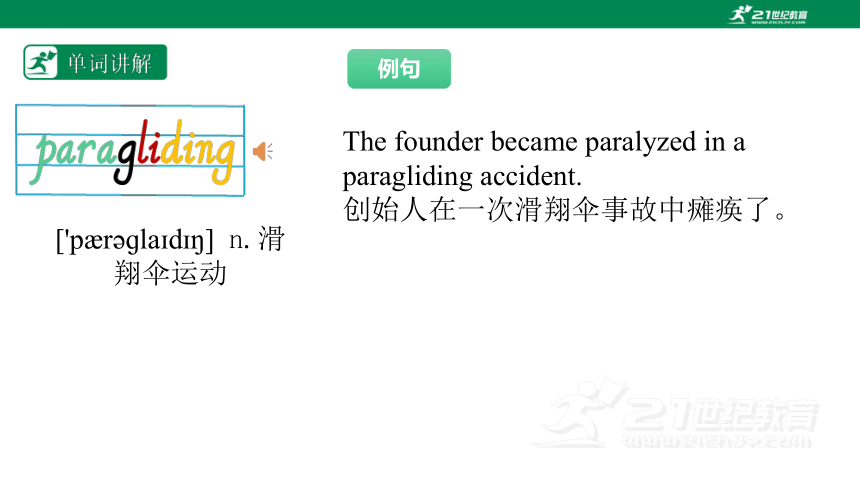
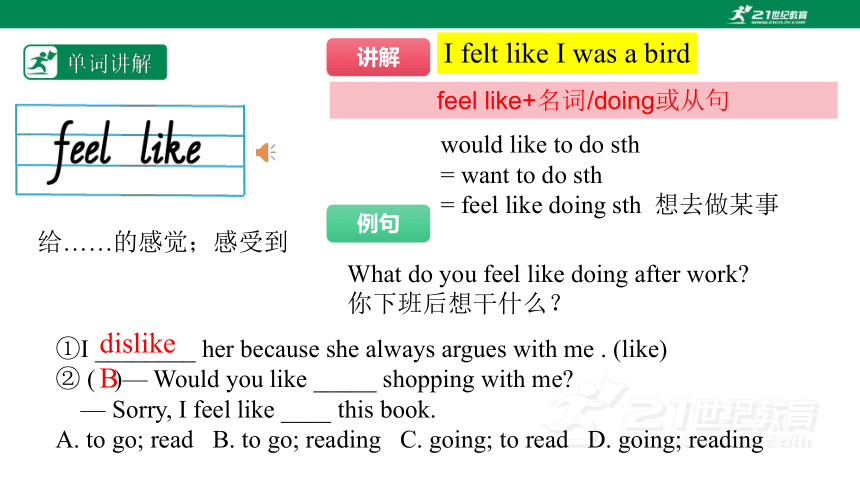
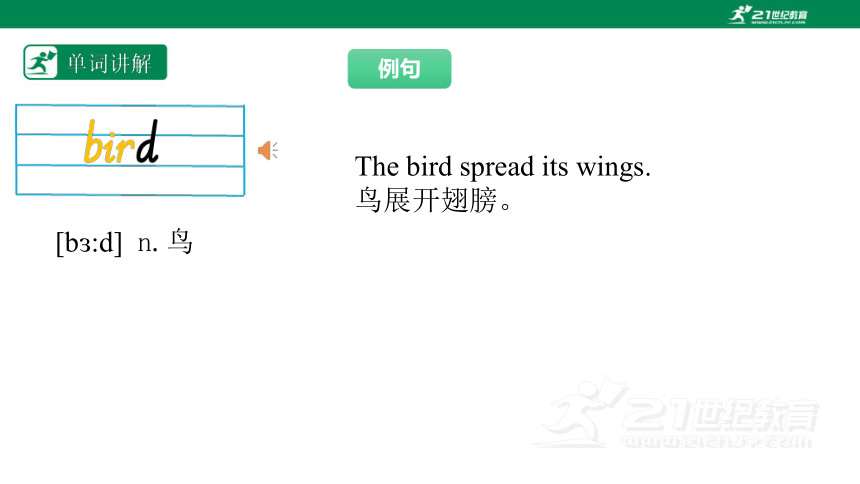
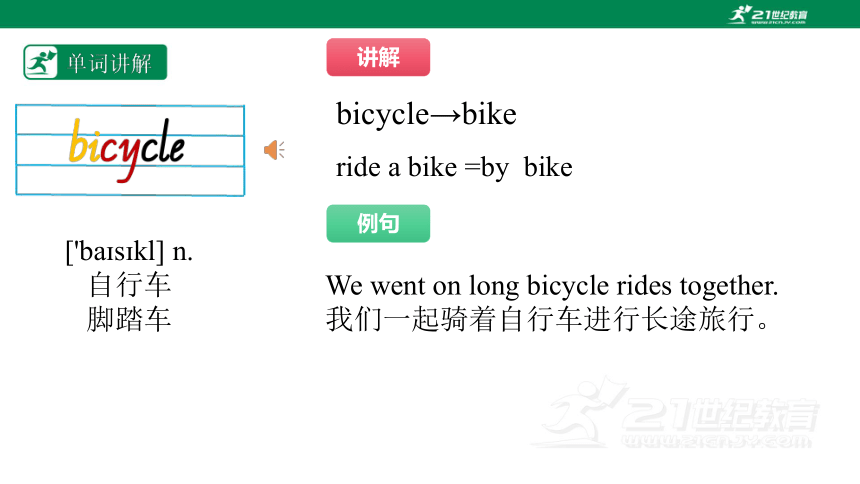
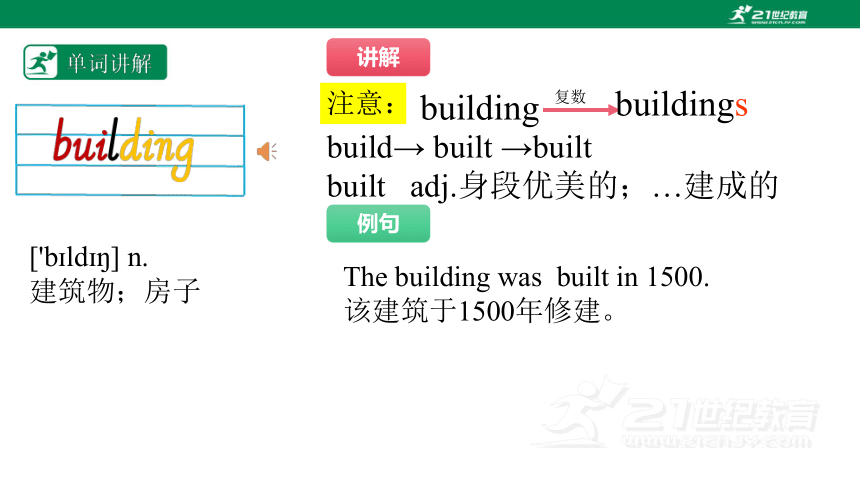
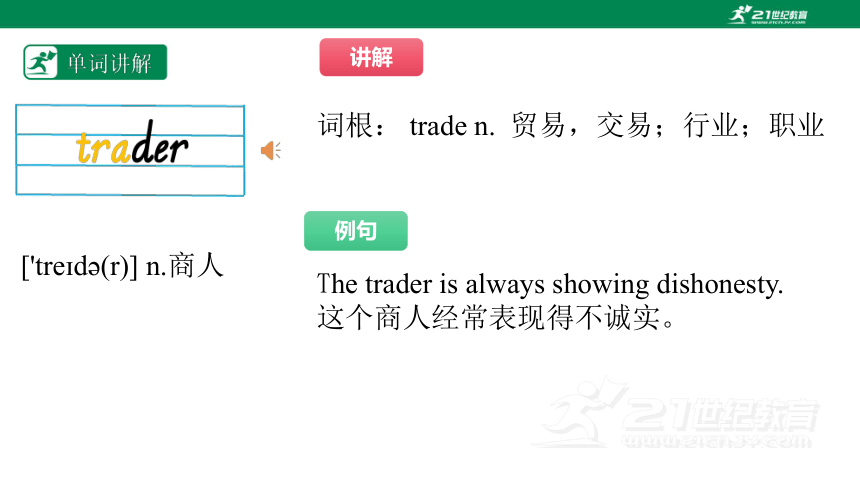
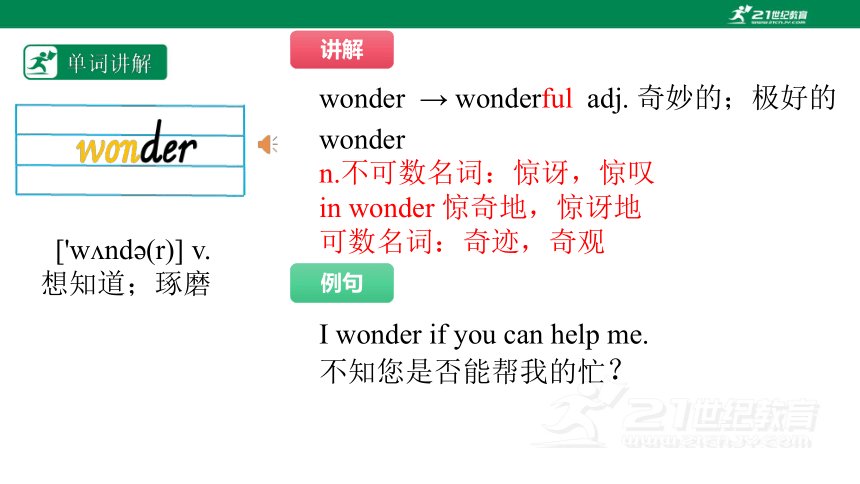
文档简介
(共39张PPT)
Unit1 Where did you go onvacation
Section B 单词讲解
[ n'd bl] adj.
有乐趣的;令人愉快的
enjoy vt. 欣赏,享受;喜爱;使过得快活
enjoyment n. 享受;乐趣;享有
It was a sunny and enjoyable day.
这是阳光明媚、令人愉快的一天。
讲解
例句
短语
enjoy sth. 喜欢某事物
enjoy doing sth. 喜欢做某事
enjoy oneself 玩得开心,过得愉快,与have fun 或have a good/great/nice time 同义。
[ k't v ti] n.
活动;活跃
activity(n.)→ activities(pl.)
act v.→ active adj.→ activity n.
Most of the students are active
in the outdoor activities.
[d 'sa d] v.决定;选定
deciding
1.decide to do sth=make up one’s mind to do sth
决定去做某事
We decide to go to New York next month.
我们决定下个月去纽约。
2.decide+从句
He decided that he would buy a new computer.
他决定买一台新电脑。
n. decision 决定,make a decision表示“做决定”。
Eg:I made a decision to study harder. 我决定更加努力地学习。
讲解
decided
decide
decided
过去式
过去分词
现在分词
第三人称单数
decides
短语
try
[tra ] v.
尝试;设法;努力
trying tries
1.try on 试穿
2.try to do sth 努力做某事
(侧重尽力,为了达到目的而努力)
He tried to finish the work ahead of time.
他设法提前完成任务。
3.try doing sth 试图做某事
(只是一种新的尝试,并没有一定明显的目的性)
have a try 试一试
tried
tired
try
过去式
过去分词
现在分词
第三人称单数
短语
讲解
['p r ɡla d ] n.滑翔伞运动
The founder became paralyzed in a paragliding accident.
创始人在一次滑翔伞事故中瘫痪了。
例句
给……的感觉;感受到
What do you feel like doing after work
你下班后想干什么?
would like to do sth
= want to do sth
= feel like doing sth 想去做某事
①I ________ her because she always argues with me . (like)
② ( )— Would you like _____ shopping with me
— Sorry, I feel like ____ this book.
A. to go; read B. to go; reading C. going; to read D. going; reading
I felt like I was a bird
feel like+名词/doing或从句
dislike
B
[b :d] n.鸟
The bird spread its wings.
鸟展开翅膀。
例句
['ba s kl] n.
自行车
脚踏车
bicycle→bike
We went on long bicycle rides together.
我们一起骑着自行车进行长途旅行。
ride a bike =by bike
['b ld ] n.
建筑物;房子
build→ built →built
built adj.身段优美的;…建成的
The building was built in 1500.
该建筑于1500年修建。
building
注意:
复数
buildings
['tre d (r)] n.商人
词根: trade n. 贸易,交易;行业;职业
讲解
例句
The trader is always showing dishonesty.
这个商人经常表现得不诚实。
['w nd (r)] v.
想知道;琢磨
wonder → wonderful adj. 奇妙的;极好的
I wonder if you can help me.
不知您是否能帮我的忙?
wonder
n.不可数名词:惊讶,惊叹
in wonder 惊奇地,惊讶地
可数名词:奇迹,奇观
讲解
例句
['d fr ns] n.
差别;差异
1.be different from= be not the same as
与…..不同 (反) the same as “和...一样”
2.make a/the difference表示“要紧,起作用,有所不同”
Does his absence make a difference to your work
假如没有他,对你的工作会有影响吗?
different adj. 不同的
→differently adv. 不同
→difference n. 不同点
讲解
短语
[t p] n.顶部;表面
at the top of 在......顶端(强调在某一个点上)
on the top of 在......顶部;在上部(强调在某一个面上)
I like it at the top of my books.
我喜欢它放到我书的顶端
讲解
例句
[we t] v.等候;
wait v 等待→ waiter n (男)服务员
讲解
1.wait for 意为“等候”,其后接内容。
I’ll wait for you at the door.
2.wait to do sth 等待做某事
The longer you wait to do something,
the more difficult it will be to get it done.
短语
3.can’t wait to do sth
迫不及待的做某事
I can’t wait to see you again.
[ m'brel ] n.
伞;雨伞
an umbrella
Can I borrow your umbrella
借你的伞用一下行吗?
注意冠词
[wet] adj.
湿的;下雨的
wet →dry
My shirt was wet.
我的衬衣湿了
因为
because of与because
(1)because of介词短语,“因为,由于”,后可接名词、代词或动名词,
She’s worried because of her son.
讲解
(2) because连词,“因为”, ,表示直接明确的原因或理由。
He didn’t go to school yesterday because he was ill.
(3) because 还可以回答why 引导的句子(because 是连词,后接句子,是主句的直接原因,常用来回答由why 引导的特殊疑问句。)
— Why do you like pandas
— Because they are cute.
(4) because 和so 不能一起连用,二者只能用其一。
不能接句子。
引导状语从句
注意
1.Tom didn’t go to school yesterday ____ he was ill.
A. as B. so C. because D. while
2.Mo Yan’s books have been sold out in many book stores ___ his winning of the Nobel Literature Prize.
A. because B. since C. as D. because of
C
D
[b 'l ] prep. adv.
在……下面;
到……下面
below above
Her skirt is below her knees.
她的裙长过膝。
反义词
[ 'n f] adj. adv.
足够的(地);充足的(地);充分的(地)
(1)adj. 足够的,修饰可数名词或不可数名词,可以放在名词前面,也可以放在名词后面;
enough+ n. +to do sth.
Eg: We still have enough time to make this birthday cake look good enough.
(2) adv. 足够地,修饰形容词、副词、动词,并放在其后。
serious enough 足够严肃
She has enough money, and is also beautiful enough.
讲解
This movie wasn’t ______. He fell asleep half way through it.
A. interesting enough B. enough interesting
C. interested enough D. enough interested
(3) not enough to do sth.(不够...去做某事)与too...to...(太...而不能), so...that...(如此...以致于)句型转换
Eg: He is not old enough to go to school.
=He is too young to go to school.
=He is so young that he can’t go to school.
Q.He is old enough to go to school.= He is ___ ____ that he can go to school.
She was so weak that she can’t take good care of her children.= She was ___ weak ___take care of her children.
A
so old
too
to
['h ɡri] adj.饥饿的
hunger(n.)→_________(adj.)饥饿的
hungry
反义词:full
I'm hungry. Let's stop for lunch.
我饿了。我们停下来吃午饭吧。
讲解
例句
[ z] adv.像……一样;
如同 conj. 当……时;
如同
such as例如;像……这样
You're as tall as your father.
你和你父亲一样高。
as...as 与...一样
[h l] n. 小山;山丘
mountain n.山脉
There is a hill over there
那里有一座山.
[d k] n.鸭
复数:ducks
It's a yellow duck.
它是一只黄色的鸭子
[d s'la k] v.n
不喜爱(的事物);
厌恶(的事物)
like(v.& n.)→dislike(反义词)
不喜爱(的事物);厌恶(的事物)
dislike v. “不喜欢;厌恶”,其后接名词、代词或动名词形式作宾语。同义词是hate。
Mary ______ the hamburgers.玛丽不喜欢汉堡包。
dislike n. “厌恶的事情”
dislikes
(反义词) like v 喜欢
(1) like sth 喜欢某物 I like English/ apples.
(2) like doing sth 喜欢做某事(表示长期性的兴趣爱好) She likes swimming
(3) would like to do sth= want to do sth= feel like doing sth想去做某事
tian'anmen square
天安门广场
the Palace Museum
故宫博物院
Central Park
中央公园
Huangguoshu Waterfall
黄果树瀑布
Hong Kong
香港
Malaysia
马来西亚
Malaysian /ma 'ler3n/ adj.马来西亚的
n.马来西亚人
Georgetown
乔治城
Weld Quay
海瑾街
Penang Hill
槟城山
Unit1 Where did you go onvacation
Section B 单词讲解
[ n'd bl] adj.
有乐趣的;令人愉快的
enjoy vt. 欣赏,享受;喜爱;使过得快活
enjoyment n. 享受;乐趣;享有
It was a sunny and enjoyable day.
这是阳光明媚、令人愉快的一天。
讲解
例句
短语
enjoy sth. 喜欢某事物
enjoy doing sth. 喜欢做某事
enjoy oneself 玩得开心,过得愉快,与have fun 或have a good/great/nice time 同义。
[ k't v ti] n.
活动;活跃
activity(n.)→ activities(pl.)
act v.→ active adj.→ activity n.
Most of the students are active
in the outdoor activities.
[d 'sa d] v.决定;选定
deciding
1.decide to do sth=make up one’s mind to do sth
决定去做某事
We decide to go to New York next month.
我们决定下个月去纽约。
2.decide+从句
He decided that he would buy a new computer.
他决定买一台新电脑。
n. decision 决定,make a decision表示“做决定”。
Eg:I made a decision to study harder. 我决定更加努力地学习。
讲解
decided
decide
decided
过去式
过去分词
现在分词
第三人称单数
decides
短语
try
[tra ] v.
尝试;设法;努力
trying tries
1.try on 试穿
2.try to do sth 努力做某事
(侧重尽力,为了达到目的而努力)
He tried to finish the work ahead of time.
他设法提前完成任务。
3.try doing sth 试图做某事
(只是一种新的尝试,并没有一定明显的目的性)
have a try 试一试
tried
tired
try
过去式
过去分词
现在分词
第三人称单数
短语
讲解
['p r ɡla d ] n.滑翔伞运动
The founder became paralyzed in a paragliding accident.
创始人在一次滑翔伞事故中瘫痪了。
例句
给……的感觉;感受到
What do you feel like doing after work
你下班后想干什么?
would like to do sth
= want to do sth
= feel like doing sth 想去做某事
①I ________ her because she always argues with me . (like)
② ( )— Would you like _____ shopping with me
— Sorry, I feel like ____ this book.
A. to go; read B. to go; reading C. going; to read D. going; reading
I felt like I was a bird
feel like+名词/doing或从句
dislike
B
[b :d] n.鸟
The bird spread its wings.
鸟展开翅膀。
例句
['ba s kl] n.
自行车
脚踏车
bicycle→bike
We went on long bicycle rides together.
我们一起骑着自行车进行长途旅行。
ride a bike =by bike
['b ld ] n.
建筑物;房子
build→ built →built
built adj.身段优美的;…建成的
The building was built in 1500.
该建筑于1500年修建。
building
注意:
复数
buildings
['tre d (r)] n.商人
词根: trade n. 贸易,交易;行业;职业
讲解
例句
The trader is always showing dishonesty.
这个商人经常表现得不诚实。
['w nd (r)] v.
想知道;琢磨
wonder → wonderful adj. 奇妙的;极好的
I wonder if you can help me.
不知您是否能帮我的忙?
wonder
n.不可数名词:惊讶,惊叹
in wonder 惊奇地,惊讶地
可数名词:奇迹,奇观
讲解
例句
['d fr ns] n.
差别;差异
1.be different from= be not the same as
与…..不同 (反) the same as “和...一样”
2.make a/the difference表示“要紧,起作用,有所不同”
Does his absence make a difference to your work
假如没有他,对你的工作会有影响吗?
different adj. 不同的
→differently adv. 不同
→difference n. 不同点
讲解
短语
[t p] n.顶部;表面
at the top of 在......顶端(强调在某一个点上)
on the top of 在......顶部;在上部(强调在某一个面上)
I like it at the top of my books.
我喜欢它放到我书的顶端
讲解
例句
[we t] v.等候;
wait v 等待→ waiter n (男)服务员
讲解
1.wait for 意为“等候”,其后接内容。
I’ll wait for you at the door.
2.wait to do sth 等待做某事
The longer you wait to do something,
the more difficult it will be to get it done.
短语
3.can’t wait to do sth
迫不及待的做某事
I can’t wait to see you again.
[ m'brel ] n.
伞;雨伞
an umbrella
Can I borrow your umbrella
借你的伞用一下行吗?
注意冠词
[wet] adj.
湿的;下雨的
wet →dry
My shirt was wet.
我的衬衣湿了
因为
because of与because
(1)because of介词短语,“因为,由于”,后可接名词、代词或动名词,
She’s worried because of her son.
讲解
(2) because连词,“因为”, ,表示直接明确的原因或理由。
He didn’t go to school yesterday because he was ill.
(3) because 还可以回答why 引导的句子(because 是连词,后接句子,是主句的直接原因,常用来回答由why 引导的特殊疑问句。)
— Why do you like pandas
— Because they are cute.
(4) because 和so 不能一起连用,二者只能用其一。
不能接句子。
引导状语从句
注意
1.Tom didn’t go to school yesterday ____ he was ill.
A. as B. so C. because D. while
2.Mo Yan’s books have been sold out in many book stores ___ his winning of the Nobel Literature Prize.
A. because B. since C. as D. because of
C
D
[b 'l ] prep. adv.
在……下面;
到……下面
below above
Her skirt is below her knees.
她的裙长过膝。
反义词
[ 'n f] adj. adv.
足够的(地);充足的(地);充分的(地)
(1)adj. 足够的,修饰可数名词或不可数名词,可以放在名词前面,也可以放在名词后面;
enough+ n. +to do sth.
Eg: We still have enough time to make this birthday cake look good enough.
(2) adv. 足够地,修饰形容词、副词、动词,并放在其后。
serious enough 足够严肃
She has enough money, and is also beautiful enough.
讲解
This movie wasn’t ______. He fell asleep half way through it.
A. interesting enough B. enough interesting
C. interested enough D. enough interested
(3) not enough to do sth.(不够...去做某事)与too...to...(太...而不能), so...that...(如此...以致于)句型转换
Eg: He is not old enough to go to school.
=He is too young to go to school.
=He is so young that he can’t go to school.
Q.He is old enough to go to school.= He is ___ ____ that he can go to school.
She was so weak that she can’t take good care of her children.= She was ___ weak ___take care of her children.
A
so old
too
to
['h ɡri] adj.饥饿的
hunger(n.)→_________(adj.)饥饿的
hungry
反义词:full
I'm hungry. Let's stop for lunch.
我饿了。我们停下来吃午饭吧。
讲解
例句
[ z] adv.像……一样;
如同 conj. 当……时;
如同
such as例如;像……这样
You're as tall as your father.
你和你父亲一样高。
as...as 与...一样
[h l] n. 小山;山丘
mountain n.山脉
There is a hill over there
那里有一座山.
[d k] n.鸭
复数:ducks
It's a yellow duck.
它是一只黄色的鸭子
[d s'la k] v.n
不喜爱(的事物);
厌恶(的事物)
like(v.& n.)→dislike(反义词)
不喜爱(的事物);厌恶(的事物)
dislike v. “不喜欢;厌恶”,其后接名词、代词或动名词形式作宾语。同义词是hate。
Mary ______ the hamburgers.玛丽不喜欢汉堡包。
dislike n. “厌恶的事情”
dislikes
(反义词) like v 喜欢
(1) like sth 喜欢某物 I like English/ apples.
(2) like doing sth 喜欢做某事(表示长期性的兴趣爱好) She likes swimming
(3) would like to do sth= want to do sth= feel like doing sth想去做某事
tian'anmen square
天安门广场
the Palace Museum
故宫博物院
Central Park
中央公园
Huangguoshu Waterfall
黄果树瀑布
Hong Kong
香港
Malaysia
马来西亚
Malaysian /ma 'ler3n/ adj.马来西亚的
n.马来西亚人
Georgetown
乔治城
Weld Quay
海瑾街
Penang Hill
槟城山
同课章节目录
- Unit 1 Where did you go on vacation?
- Section A
- Section B
- Unit 2 How often do you exercise?
- Section A
- Section B
- Unit 3 I'm more outgoing than my sister.
- Section A
- Section B
- Unit 4 What's the best movie theater?
- Section A
- Section B
- Unit 5 Do you want to watch a game show?
- Section A
- Section B
- Unit 6 I'm going to study computer science.
- Section A
- Section B
- Unit 7 Will people have robots?
- Section A
- Section B
- Unit 8 How do you make a banana milk shake?
- Section A
- Section B
- Unit 9 Can you come to my party?
- Section A
- Section B
- Unit 10 If you go to the party, you'll have a grea
- Section A
- Section B
